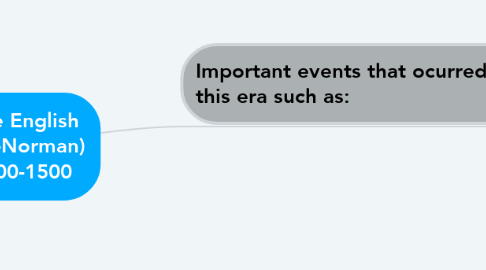
1. Important events that ocurred in this era such as:
1.1. The battle of hastings in 1066.
1.2. On October 14th, King Harold was killed by an arrow in his eye.
1.2.1. As a consequence of that, William Duke of Normandy was crowned king of England on Christmas day of 1066.
1.2.2. French held its place as the language of the government, and English as the language of household staff and common people.
1.2.3. After that, in 1204, King John and the Anglo-Normans fought again for possession of Normandy.
1.2.4. The Anglo-Normans lost the battle against the French king who also added that "The King of England can't fight, or speak French well."
1.2.4.1. As a result
1.2.4.1.1. English subjects were ordered to speak English (English was the official speech of England again)
1.3. The black death
1.3.1. A disease outbreak spread from China through Asia, the middle east, Africa, and Europe.
1.3.2. This Epidemic destroyed as much as 1/5 of the worlds' population.
1.3.3. 50% of Europeans were killed in just four years.
1.4. Yersinia Pestis same bacterium caused diseases throughout history.
1.4.1. Plague of Justinian 541 A.D.
1.4.2. Black death 1347.
1.4.3. Third plague pandemic 1347.
1.5. In High middle Ages 1001-1300.
1.5.1. High fertility rates combine with reduced harvest meant the land could no longer support its population.
1.5.2. Due to low wages, most Europeans in the 14th century experienced famine, poverty, and poor health which led them vulnerable to infection.
1.5.3. Many of the elite including the Latin- speaking clergy and French-speaking aristocracy died.
1.5.4. As a consequence:
1.5.4.1. English became more important, and in 1362, parliament passed a law stating that on all pleas would be heard in English and not Norman French.
1.5.4.2. The importance of English continued until French was seen as an alien tongue of a foreign state.
1.6. The great Vowel Shift (GVS)
1.6.1. Pronunciation of most vowels began to change, and it made great important changes to middle English.
1.6.2. This took place in Southern England (C. 1350-C.1700) Middle English long vowels changed their pronunciation.
1.6.3. GVS is responsible for the fact that English spellings now often strongly deviate in their representation of English pronunciations.
1.6.4. Otto Jespersen (1860-1943) was a Danish linguist who studied GVS, and he coined the term.
1.6.5. Some GVS causes:
1.6.5.1. The rapid migration of people from Northern England to the Southeast caused a mixing accent forcing a change in the standard London vernacular.
1.6.5.2. The influx of French loan words was a major factor in the shift.
1.6.5.3. The wars with France caused hypercorrection in order to deliberately make English sound less like French.
1.6.5.4. Examples:
1.6.5.4.1. Old English ded (pronounced to rhyme with modern maid) became modern English deed.
1.6.5.4.2. Hus (which rhyme with mouse) became house.
1.6.6. The changes were probably completed sometime early in the 17th century during English period (EmodE.)
1.6.6.1. Other Changes in ME
1.6.6.1.1. Unestressed vowels.
1.6.6.1.2. Noun endings indicating grammatical function were shortened or last.
1.6.6.1.3. Grammatical gender of nouns was also lost and changes in word order took place.
1.6.6.2. The close of ME
1.6.6.2.1. English displaced French and Latin as the written language of the people. Although French was taught as a foreign language in order to communicate with their neighbors.
